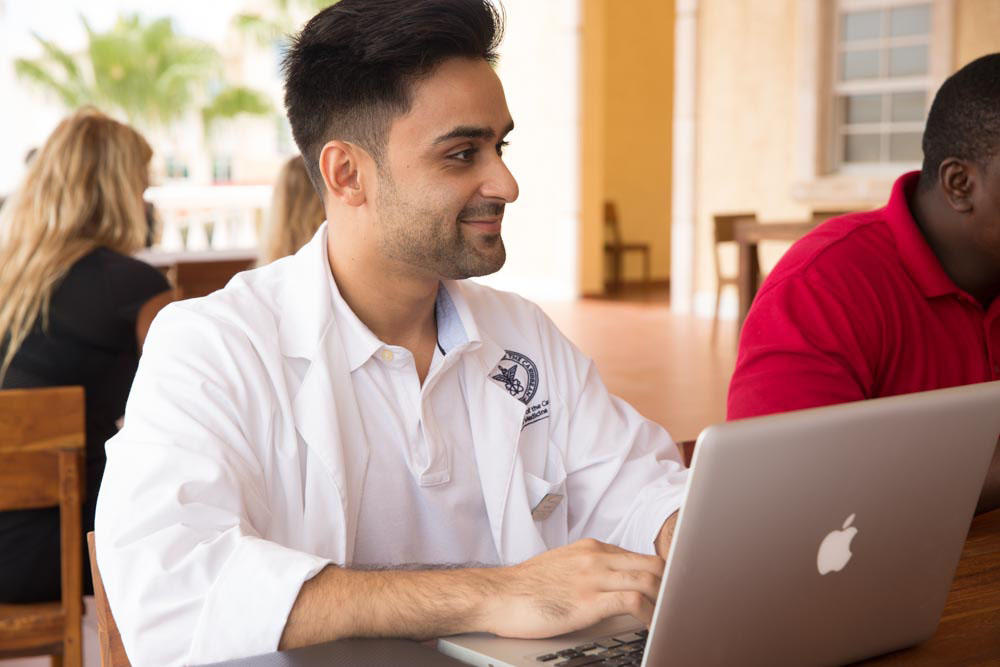Director of Admissions
Laura Dwyer
ldwyer@aucmed.edu
When applying to medical school, an important (and sometimes overlooked) component of the admissions process is your medical school personal statement—and you might be surprised to learn just how important admissions officers consider this piece of your application to be.
“I read every personal statement before I interview a student—it’s where I get a sense of who they are, their ambitions, what their past has been like, and how their journey has been. Really, the personal statement is a prospective student’s one chance to really present themselves in the way they want the admissions committee to see them,” says Laura Dwyer, Director of Admissions at American University of the Caribbean School of Medicine (AUC).
Dwyer has read hundreds of personal statements throughout her career. Recently, we sat down with her to discuss tips, strategies, and best practices prospective students should follow when crafting their personal statements. Check them out below.
Medical School Personal Statement Tips
How to write a personal statement for medical school? Write from the heart.
As you’re crafting your medical school personal statement, make sure you’re telling a story that’s distinctly yours. Avoid simply writing what you think the admissions committee wants to read—instead, take this opportunity to tell them about yourself and show them why you think you’re a strong candidate.
And be honest. “It’s very easy to tell when someone’s being genuine versus when they’re writing what they think you want to hear,” Dwyer notes. “When someone’s being genuine, and honest, and they’re sort of laying out their life story on the line, those types of personal statements really come across better.”
Another effective approach: Use the personal statement to explain a blemish on your academic record, such as poor performance or a leave of absence. Don’t be afraid to delve into personal challenges that may have resulted in an atypical academic performance, or a family tragedy that caused you to miss a semester. Admissions officers need to know that information to make an informed decision about your candidacy.
Regardless of the theme you choose, keep in mind that a genuine personal statement will go further than a generic one. The statement you craft is vital in giving your admissions advisor an opportunity to get to know you, and may pique their interest in offering you an interview.
Be as specific and detailed as you can.
What should be in a medical school personal statement? As far as what you choose to write about, that’s ultimately up to you. Many students use this essay to describe their motivations to enter medical school—which is fine (albeit a fairly common approach), Dwyer says, as long as there is a deep narrative hook surrounding your story. For example, “I want to help people” or “my parents are physicians” are certainly valid inspirations for pursuing a medical degree, but those statements alone don’t provide much insight into who you are. Instead, try supporting these claims with a deeper exploration of your unique interests and experiences and how they have shaped you.
“I had one student who was a first-generation American—[his] family was from Pakistan, and his parents were both physicians in Pakistan, but they gave it up to move to the United States,” Dwyer says. “The gist of the essay was that his parents never pressured him, but that [the student] saw the struggle that his parents had and how important education was to them—and how his parents had given so much up so that he could succeed. It was all very genuine, and it really affected me.”
The moral of the story—don’t be shy about your personal details. These details help admissions officers really get to know you, and that could impact your chances of admission.
Make sure you proofread.
Once you have selected your topic and begin to shape your story on paper, remember that how you write something can be just as important as what you write. The nuts and bolts of any written document boil down to basic grammar and writing skills. To give the most accurate impression of yourself, Laura Dwyer suggests you avoid throwing in big words that you don’t use in everyday speech. Be yourself and write like yourself.
“I like well-written personal statements, but I’m not looking for a New York Times caliber piece,” says Dwyer. “Don’t sit with a thesaurus next to you—write like you write. Remember, we want to know who you are: If you don’t use GRE or SAT words in your everyday vernacular, avoid using them in your personal statement.”
That said, it is equally important to stay within the word limit and keep an eye on grammar, syntax, and tone. Those who read your statement are primarily interested in learning more about you, and may not be sticklers for perfection, but they like to see that an effort has been made to put forth your best work. Simple mistakes that could have been caught by spellcheck or a basic grammar check can convey a lack of effort on your part.
Within the medical field, the caliber of your character can be just as crucial to your success as your breadth of knowledge. The personal statement is your first opportunity to provide your future medical school with a glimpse of the person you are and the kind of doctor you are capable of becoming, and it is an opportunity worth seizing.




